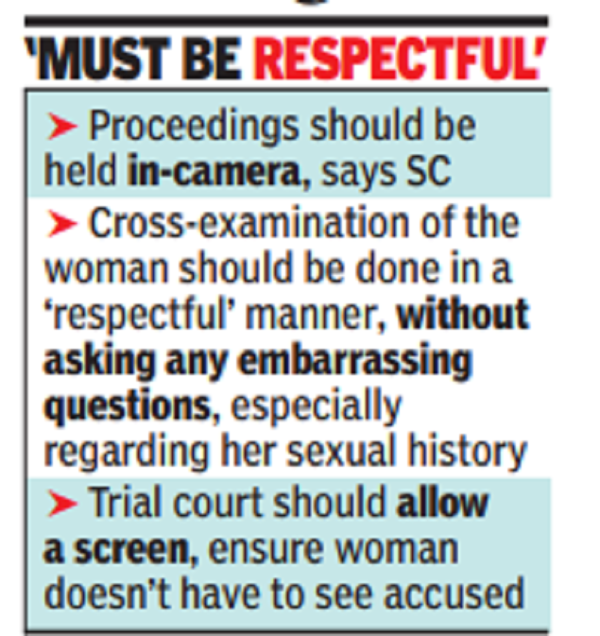
Cross-examine survivors of assault in 1 sitting: Supreme Court | India News
[ad_1]
A bench of Justices D Y Chandrachud and J B Pardiwala said courts should be alive to the fact that a survivor of sexual violence suffers from trauma and societal shame due to the unwarranted stigma attached to her and indicated that the proceedings should not make her life more difficult.
“It is the duty and responsibility of trial courts to deal with the aggrieved persons before them in an appropriate manner, by allowing proceedings to be conducted in camera, where appropriate, either under Section 327 CrPC or when the case otherwise involves the aggrieved person (or other witness) testifying as to their experience of sexual harassment/violence,” the bench said.

It said the trial court should allow installation of a screen to ensure that the woman does not have to see the accused while testifying or, alternatively, direct the accused to leave the room while her testimony is being recorded. It should also ensure that counsel for the accused conducts her cross-examination in a respectful fashion and without asking embarrassing or inappropriate questions, especially regarding her sexual history, the bench added.
The court passed the order while ordering a probe into a sexual molestation complaint filed by a yoga instructor against the vice-chancellor of a Gwalior-based institute. The woman had approached SC after police allegedly refused to file FIR and the judicial magistrate also did not order a probe into her claim.
The court held that it is the duty of police to register an FIR whenever a cognisable offence is made out in a complaint and said that police’s inaction in this case was “unfortunate”. It said the magistrate also failed in his duty as the matter ought to be sent to the police for investigation.
“Especially in cases alleging sexual harassment, sexual assault or any similar criminal allegation wherein the victim has possibly already been traumatised, the courts should not further burden the complainant and should press upon police to investigate. Due regard must be given to the fact that it is not possible for the complainant to retrieve important evidence regarding her complaint. It may not be possible to arrive at the truth of the matter in the absence of such evidence. The complainant would then be required to prove her case without being able to bring relevant evidence (which is potentially of great probative value) on record, which would be unjust,” the bench said.
“We wish to once again reiterate the importance of courts dealing with complainants of sexual harassment and sexual assault in a sensitive manner. It is important for all courts to remain cognisant of the fact that the legal process tends to be even more onerous for complainants who are potentially dealing with trauma and societal shame due to the unwarranted stigma attached to victims of sexual harassment and assault. At this juncture, especially in cases where police fail to address the grievance of such complainants, the courts have an important responsibility,” it said.
[ad_2]
Source link


